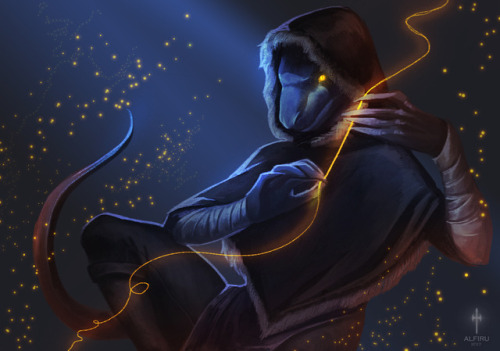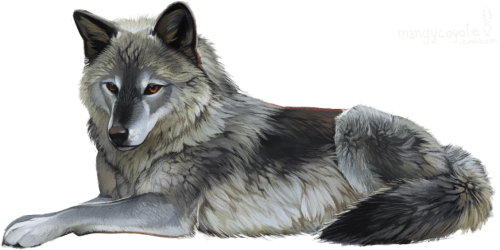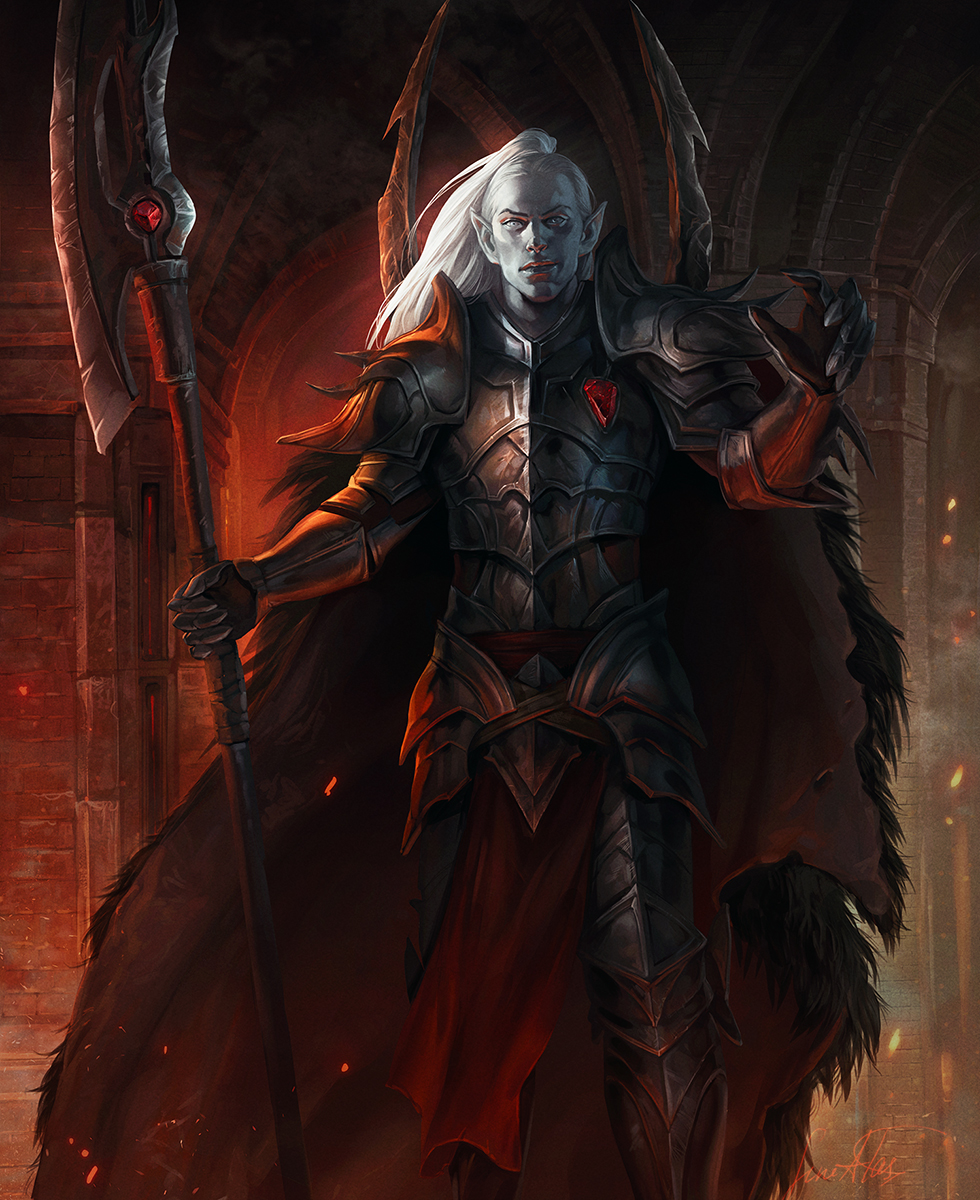Art will be here

▷
Age: 28
▷
Race: Nord
▷
Birthsign: the Steed
▷
Family Origins: The rural area surrounding Windhelm

Sigri is built like a typical Nord woman: sturdy and tall. She stands at 5'11, the shortest of all her siblings. Her build is muscular, especially in her upper body. Her shoulders are broad and her arms strong from years of working a mill and practicing as an archer. Sigri moves fluidly, rarely making an unintentional movement and always aware of her footing from many times spent in rough terrain. This is often reversed in man-made settings, like city streets or tavern floors, where she feels disconnected from her sense of balance just
slightly enough that after a couple of drinks, she could be found tripping over chairs in a crowded room. She is most at home with a forest floor or footpath beneath her. Her rough upbringing also left her littered in light scars, though none are so grotesque as to draw attention, many are sprinkled across her fair skin, especially on her arms and legs -- relics from the wilderness rather than battle, as far as can tell.
While too muscled to be considered a conventionally attractive woman, her face has soft features. Her warm, brown, almond-shaped eyes are kind and inviting combined with her round cheeks. Her face looks like that of an even younger woman -- Sigri could have been confused for a child if one judged her by face alone. Her hair adds to the impression. Her brown locks are messy and hardly brushed, though clean, and her natural waves often take over her looks. Her hair is just long enough to tuck behind her ears while hunting or working, but kept too short for proper braiding, which Sigri was never any good at. Even when practicing on her younger sisters, her mother's teachings in that regard never got through to her. She often tucks and un-tucks her hair when uncertain, or pushes it back before beginning a task that requires focus.
Sigri leans towards practical clothing. She doesn’t think about her appearance, but instead prefers to ensure that her clothes don’t get in the way of whatever she’s doing. Often, this means she wears simple travelling clothes, with thick fur or leather for protection. In hotter climates, she would prefer to recklessly forego thicker armour than overheat. She favours browns, and her clothes are often old and worn. Coming from a poor family, Sigri is more accustomed to wearing hand-me-downs and repairing or reusing fabric than buying new.
She had perhaps never worn clothing nicer than a simple dress on special occasions, and was never fond of it, even then. Anything that impedes her movement is
bad and a waste of time, she thinks, and it's the same with people who do. As quickly as she would shed fancy clothing or uncomfortable shoes, Sigri would barrel right to the point in conversation. Similarly, she won't hesitate to rip or damage her clothing, despite them being a resource in a way -- something she would usually value -- as the clothes are impeding work. Sigri doesn't hesitate when given a task, and her footing shows it. At any given time, Sigri is ready on her feet; she can rarely be seen leaning, nor sitting or sleeping in a way which can't be quickly stood up from.
The heat is her worst enemy. Coming from an area with such a short summer season, the heat of Hammerfell was nightmarish in comparison. She rapidly strips off layers of clothing when even remotely warm, preferring
anything as an alternative to heat. Sigri isn’t very modest, and usually dresses in whatever way is most comfortable or practical at the given time — and she understands nothing about sunburn.

Sigri’s rural nordic upbringing shows itself in her mannerisms, and her enjoyment of feasting and drinking. She’s small-town to her core - large cities and travel are filled with wonder for her, since until age 27, she had never left Skyrim, nor been to a city except Windhelm. She is fiercely loyal to friends and family, even if she isn’t with them because of her self-exile.
She typically comes off as jovial, and enthusiastic. Sigri buries her troubles deep. She loves talking about her family, but avoids any mention of her troubles with them as if they would burn her. Like she did when at the College of Winterhold, she makes friends quickly. She engages with others happily, but she rarely develops close relationships. After her experience with her husband, she doesn’t believe in romance. Sigri has never been in love, and doubts her ability to.
Sigri gets along best with others who are commoners, and those who are loud. People who are too refined rub her the wrong way, as she often does them. She holds no ill-will for those who are on the quiet and inconspicuous side, but rather they often find her prodding and joking more irritable, or dislike the attention it attracts.
The Nord feels most at home in the outdoors. She loves hunting, and sharing hunting stories. She feels most alive and most herself when stalking prey, without a building in sight. She also relishes the chance for a good ride on horseback, or a swim. Swimming is one advantage she believes to come out of warm weather. Back home, the water was often freezing for most of the year.
Sigri lacks refine, and femininity. She disdains “softness” and always wants to be recognized as strong and capable. Though she doesn’t realize it, Sigri has always been a caretaker; she always looked after her younger sisters, and later her son. She cares greatly for children, and animals, and likes to help where she is able to make a difference. She often believes her presence is detrimental, so her fashion of helping may appear to be avoiding - like in Jory’s case.

Sigri was born to a large family in rural Skyrim. Her parents owned a farm in the area outside of Windhelm - too far for casual visits, but close enough for the occasional business trip with her father. Hafgar and Alga, her parents, had four other living children when Sigri was growing up. The eldest two, her brothers Kari and Eric, were respectively two and three years older than her. Her sisters, Valensa, Sinda, and Ivana, were younger by over 7 years. During the gap, the family suffered a series of miscarriages and infant deaths. Alga held on tightly to all her children because of this, but Sigri, as the youngest during these events, was cherished by her in particular. She was a doting mother to the extreme, always hovering and worrying about Sigri’s scrapes and bruises.
However, Sigri was always a rebellious child. Her mother took her under her wing, teaching her to keep care of the farm household. Helping the rest of her family with the fields was full time work during the growing season, and during the winter months her mother would teach her to care for the household. Though Sigri loved the time spent with her mother, she hated being cooped up. At every opportunity, Sigri would follow her older brothers out to hunt in the winter months, and occasionally during the summer. The neighboring households were mill households, two of which were quite nearby. Frequently, the others in their age group would join in with them and a parent or another for these trips. The community was close-knit.
The seasons were hard on the farm. Sigri never shied away from the difficult work involved, often doing both tasks for her mother inside as well as helping with the more physically extorting outdoor tasks. Despite the work, the harvests were lean and times weren’t easy, especially considering the short growing season. Still, the memories are of a fond childhood.
Things changed when Sigri was about 15. Ulfric Stormcloak changed it; the Civil War broke out. There was a dramatic shift in tone in her life. Her friends spoke more about joining the army than hunting, and the usual concern her mother held in her eyes had turned to a pure fear.
It didn’t take long for her brothers to depart for Windhelm, their friends in tow. Sigri had been the youngest, too young for war, her mother insisted. After the tears pooled in Alga’s eyes, Sigri didn’t mention the idea again.With Kari and Eric gone, and her sisters too young for heavy lifting, the workload was far heavier, leaving Sigri with little time for pleasure — or thinking.
It felt like an extended business trip. At times, her elder brothers, and often their father, would travel so Windhelm for a few nights. It wasn’t until the soldiers arrived home at the end that reality set in. Eric came first, the neighbor friends in tow, but the group was shattered. Only about two thirds of those who left returned.
When her father spotted Eric at the end of their property, Sigri and the rest of her family came running. As they stood at the door, the family could tell one thing: the second figure with him was female. Sigri’s mother reached down and clutched her hand tightly as they came closer. Eric stopped in front of them, and as they met eyes, he shook his head. Kari didn’t made it. Alga let go of Sigri’s hand and rushed to her son, clutching him and sobbing, as Sigri stood numbly in the door.
The woman who returned with her brother was his fiancé, another soldier who was done with war. The community held a funeral for the lost - there had been several others who didn’t return - and then a wedding, a month later.
As the time went on, Sigri waited eagerly for the return of the normalcy she had as a child, of hunting trips and play fighting, of archery practice and family time around the hearth. It never came back. Things because stable, and normal, yet her brother and the others her age weren’t the same. They were somber, haunted, and none interested in the return to old times Sigri desperately desired. With each day, she wished she’d left for war — perhaps if she had been there, Kari would still be around. Perhaps her lost friends would be. Perhaps at least she would
understand why things were this way, now. Why everyone seemed older, and she like a child.
The attempt at returning to the way things were lasted only a few years. Just as her brother and his wife expected their first child, Sigri couldn’t stand the loneliness she felt around her own home any longer. She set out to follow the only other opportunity she’d had as a child: magecraft.
When Sigri was 5, she earned her name, Fire-Caller, by accidentally setting a bale of hay on fire. Fire, in particular, seemed to come naturally to her, in a way unlike the rest of her family. They said it came from her grandmother, a mage who had trained at the college, but settled down with her grandfather on the farm later. So, seeking a way to be anything but stuck and isolated in her own life, she left for the College of Winterhold.
Her endeavors at the college lasted 3 years. She became an apprentice, excelling in destruction magic rapidly. She had little talent for much else, as others told her. Sigri had no trouble making acquaintances, yet she found herself missing the comfortable close relationship she used to have with her family. Some relationships came naturally, though she had some conflict with those who were higher-class. In some cases, perhaps they did think they were better than her, but Sigri didn't exactly give them time to show their intentions before making her judgements. No matter how hard she tried at the College, she couldn’t escape her regret for leaving her family behind, a second time after staying behind from war, and eventually made the trek back to her farm.
On the day she returned, her mother greeted her with tears in her eyes and they embraced. She had a new niece and nephew to meet, and her sisters were suddenly grown-up. It felt like everyone had moved on without her, but they were welcoming. Her family even threw a welcome party. They invited all the neighbors. Her childhood friends were adults now, with families of their own. A young man who she’d never liked, someone also stayed home from war since he was just barely younger than her, showed up with flowers in hand. As he stood in front of her, sharing kind words about how he had missed her in front of everyone, she couldn’t decline his flowers. As children, she hadn't liked how soft he was. He never wrestled with her like the others, and he didn't enjoy the blood involved with hunting. However, he appeared to have grown into a strong man, who contributed to his family's mill business well.
His name was Ingvar. As the year went on, Sigri dove back into work with her family, and on the evenings, Ingvar would show up and visit. He often sat with Sigri and her family, doting on Sigri in particular. He was a romantic, but he didn’t make her heart flutter. Each time they went for a walk or a ride, she couldn't help but feel that she humored him. Each time he arrived, her mother’s eyes filled with joy at the prospect of her first daughter starting a family, but Sigri couldn't find the same joy within herself. Ingvar was a kind man, and even if he did anger her, he was always kind in resolving contentions. Whenever she tried to bring herself to turn down his attentions, he would happen to show how he doted on her niece and nephew, found common ground with her family, and she couldn't find it in herself to turn him away, both because of his kindness and effort, and the hope in her mother's eyes.
Though she always felt distance with him, as he was quite different from her, she liked him, and appreciated a lot of the gestures he made with her and her family. Still, when he proposed, with her family around the fire, and said he loved her, she knew she didn’t love him. In her heart, she felt a twinge of guilt as she returned his words of affection. Looking at the expression of hope on his face, and the tears of joy in her mother's eyes behind him, she again couldn't let them down.
They married a few months later, and Sigri moved into the neighboring mill. His family was smaller, yet more successful financially. The house was nicer, though the work was still difficult, and Sigri threw herself into learning the new business immediately. As always, Sigri used hard work to fill her days.
Ingvar's family had suffered losses from the war as well; in particular, the loss of Ingvar’s older brother left a hole in that family. After settling into the mill, her life felt stale, like she simply listed from day to day. The things she enjoyed, hunting in particular, lost their appeal, though she still occasionally went on hunting trips with her brother, the time for those things was more limited, as mill work would continue through the winter.
Things changed when she became pregnant. Her in-laws were delighted. She didn’t know how to feel, at first. Her mother’s miscarriages and stillborns certainly came to mind. She smiled, and went through the motions of expressing her joy, yet she didn’t feel the emotion at first, nor the fear. As the months went on, she began to feel something for the first time in ages. When she final gave birth to a little boy, she loved that child, more than anything she had ever loved in her life.
They named him after Ingvar’s brother, Jory. It was a nickname, but they gave it to their child as a full name, at Sigri’s request. She knew her mother in law was completely destroyed by Jory’s death, and she wanted her child to be his own person. She hoped her in-laws would be helpful, yet in her heart, she just wanted privacy with her son. By the time the child was born, Sigri and her family had their own small house on the property, separate from the main one. For four years, they lived there in a semblance of happiness. In watching Ingvar be a loving father to their child, Sigri warmed up to him more, and she made an extra effort to make him happy. She tried her best, during this time, to be an ideal wife, and even found herself hoping for a second child. Sigri was more like her own mother than she wanted to be: overbearing. But Jory was everything she loved, and she held on too tightly.
When Jory was 4, Ingvar fell sick. Jory went to stay with his grandparents, across the yard, so he wouldn’t catch it, and Sigri cared for him, for several weeks on end. The doting wife in Sigri faded as she spent less time with her son, and she became more aggravated at the differences between herself and her husband, without Jory there to soften her up. Ingvar thought he was on his deathbed at times, and Sigri though there was a chance, too, but he did begin to make his recovery. As Sigri cared for him, they began fighting - Ingvar knew she’d never loved him, but he had loved her from childhood. For days, they began tensely bringing up all the fights they had never had in the years they spent together, dredging up every old issue. The fight, the only one they'd ever had, was fierce and the cruel words Sigri tossed at him were things she would regret forever. During the fight, the hearth fire grew higher until it poured out of the fireplace. It was unintentional, but caught in the moment, she allowed it to continue, not cutting it off where she should have, nor fetching water early enough. Neither the house, nor Ingvar, were saved.
In the end, Sigri and Jory stood hand and hand, looking at the house as it burned.
Afterwards, her in-laws held her as they grieved. Ingvar was too weak to walk, and of course, once the fire was so high. It was late -- they must have been sleeping -- how could she have carried him out? Sigri refused to speak of the specifics of that night, and they never pressed her, believing her to be grieving terribly, though Sigri herself wasn't sure what emotion her tears were coming from. Perhaps the look on her son's face, when he realized his father wasn't going to be well again.
Sigri couldn’t bear to stay on the farm after his death. As she departed, confusing her late husband’s parents and Jory both, she set out about a new existence. She began by hunting again, travelling by wilderness at every opportunity, and journeying into Skyrim’s cities to sell her leftover meat.
Eventually, her skill with a bow grew into mercenary work. She couldn’t face what she had become, travelling gradually further and further from Skyrim, until she found herself in Hammerfell, for only her second job. Once it was finished, Sigri was left with doubts. As natural as brawling and shooting felt to her, she was far more accustomed to her targets being animals than people, and it’s with these doubts that she boards the
Kismet.

Sigri’s biggest regret is twofold. Firstly, she regrets her feelings surrounding her husband’s death, and feels immense guilt that she could never love him. Secondly, and most importantly, she regrets abandoning her family — first because she didn’t fight with her brothers in the Civil War, and again when she let her son down by depriving him of his parents.

Sigri is very much adrift. With the loss of the life she was used to, Sigri has no goal in mind. She is very much running
away instead of
towards. Deep in her heart, her strongest desire is to be with her son, but she believes she will only do worse by him, and doesn't deserve to be his mother. Therefore, her biggest desire is to prove to herself that somehow, she is a good person, and deserves to return and be a parent to Jory.
 Expert
Expert▷
Archery: having learned to hunt from a young age, Sigri is a masterful marksman with a bow, with a good eye for her prey’s vulnerable points
Adept▷
Destruction: during her time at the College of Winterhold, Sigri honed her abilities wit destruction magic.
▷
Athletics: Sigri has lived in rough conditions, doing hard labour for most of her life. She has spent a lot of time trekking in the wilderness, and is used to difficult terrain in particular from her hunting trips - it would be rare to see her trip.
▷
Stealth: years of hunting has made it easy for Sigri to remain unseen and unheard, especially in an outdoors setting, where she can use nature’s sounds and foliage to her advantage.
Novice▷
Hand-to-Hand: growing up with as many siblings and friends as she did, Sigri is no stranger to the odd brawl. Sparring with her brothers has accustomed her to fighting in a pinch.
▷
Restoration: during her time at the College of Winterhold, Sigri put some training into healing magic, even though her main focus was on destruction — she always wanted to be helpful for more than that.

▷Fireball
▷Flame Clock
▷Ice Storm
▷Fire Rune
▷Healing Hands
▷Healing

▷ A sturdy hunting bow, well worn and well maintained. Though not of the highest quality, Sigri knows exactly how to aim with it for the most precise shot.
▷ Travelling clothes, with some pieces of sturdy leather armour to go overtop.
▷ An iron dagger, simple and practical, more for everyday use than killing, and often used to skin animals.
▷ A necklace with a bear’s tooth on it, a hunting trophy.
▷ A torn piece of cloth which she wears around one wrist.
▷ A pouch with 75 coins, the pay from the job she just completed.
▷ Her travelling backpack, complete with water skin and some camping supplies for her usual wilderness lifestyle. A few days’ dried meat rations and some bread.
▷ A flask filled with miscellaneous liquor.





























